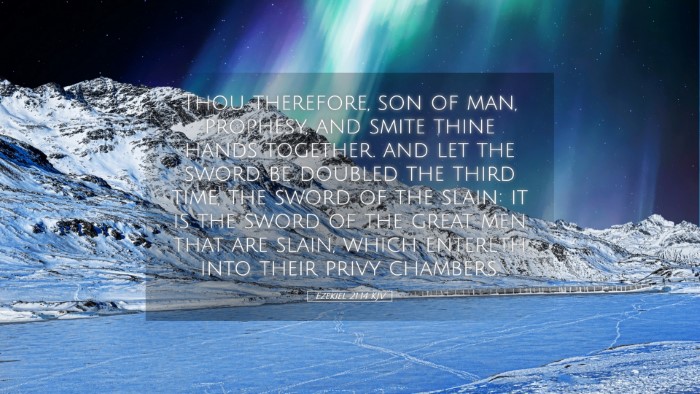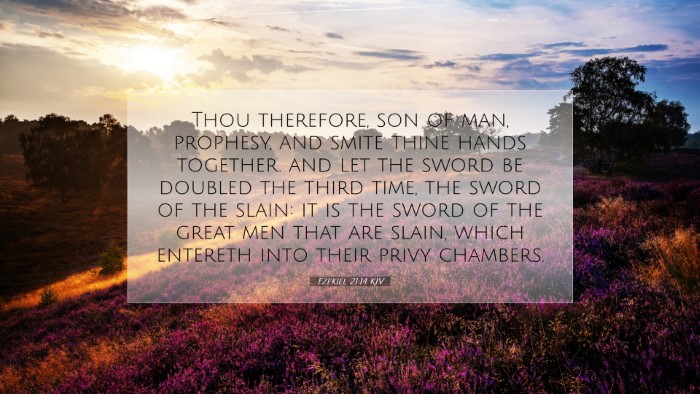Commentary on Ezekiel 21:14
Ezekiel 21:14 states:
"Thou therefore, son of man, prophesy, and smite thy hands together: let the sword be doubled the third time, the sword of the slain: it is the sword of the great men that are slain, which entereth into their privy chambers."
Contextual Overview
This verse is found within a larger prophetic narrative in the book of Ezekiel, where the prophet conveys God's judgment against Jerusalem and its inhabitants for their idolatry and wickedness. The imagery of the sword emphasizes the coming destruction and the seriousness of God's judgment.
Insights from Matthew Henry
Matthew Henry notes that this passage is rich in imagery and urgency. He emphasizes the following points:
- The Role of the Prophet: Ezekiel, referred to as "son of man," embodies both the messenger and the witness to the calamity that is to befall Israel. His actions symbolize God's judgment, which is impending and unavoidable.
- Significance of the Sword: The sword mentioned thrice represents not only destruction but also the certainty and finality of God's decrees. When God uses such strong imagery, it signifies a severe warning to His people.
- Divine Judgment: Henry underscores that God's judgment must occur due to the people's rebellion. The phrase "the sword of the slain" promises a serious consequence for those who oppose divine authority.
Insights from Albert Barnes
Albert Barnes, in his commentary, elaborates on specific elements of the verse:
- Prophetic Gesture: The act of smiting hands together can be seen as a gesture of grief and desperation, symbolizing the severe lamentation that arises from recognizing the weight of God's judgment.
- Thrice-Doubled Sword: The doubling of the sword signifies intensified calamity. Barnes interprets this motif as God's plan to ensure that the destruction of Jerusalem will be significant, involving both leaders and the common people.
- Impending Destruction of the Mighty: The mention of "great men" indicates that even those who are strong and influential within society will not escape the coming judgment; God's justice reaches all levels of society.
Insights from Adam Clarke
Adam Clarke provides additional discourse on the imagery and symbolism found in this verse:
- Symbolism of the Sword: Clarke highlights the sword as a symbol of divine retribution, asserting that God's righteous judgment falls upon those who live in defiance of His commandments.
- Inner Chambers: The reference to "privy chambers" suggests that the judgment of God extends even into the most private and secure places. No one can hide from God's oversight and forthcoming vindication against sin.
- Dramatic Prophecy: Clarke points out the dramatic nature of Ezekiel's prophetic acts, which are not merely declarations but involve physical expressions indicating the weighty message being delivered to the people.
Theological Reflections
This verse provides a rich ground for theological reflection:
- God's Sovereignty: The passage reflects God's absolute authority over nations and individuals. It highlights that human defiance does not thwart God's plans; rather, it invites divine action.
- Judgment and Mercy: While the verse conveys impending judgment, it serves as a reminder of God's character. The pronouncement of wrath comes after multiple calls to repentance, illustrating God's patience and desire for restoration.
- Call to Accountability: For modern readers, this passage calls for introspection regarding spiritual complacency and the seriousness with which God's commands must be treated.
Application for Today
For pastors, theologians, and students of the Bible, Ezekiel 21:14 should be understood as:
- A Warning Against Complacency: The urgency of Ezekiel's message serves as a warning against spiritual apathy. The church today must heed the call to genuine repentance and faithful living.
- The Reality of Judgment: In an age where the concept of judgment is often dismissed, this passage serves to reaffirm the biblical truth that God is just and will bring about accountability for actions.
- Encouragement for Evangelism: Understanding the gravity of God's impending judgment should motivate believers to share the gospel message of grace and redemption more fervently.
Conclusion
Ezekiel 21:14 encapsulates a profound message regarding God’s sovereignty, justice, and the serious nature of prophetic witness. Engaging with this verse encourages a deeper understanding of God's nature and the urgency of responding faithfully to His calls. As we reflect on these insights, may we deepen our commitment to living out the truths of Scripture in our daily lives.


